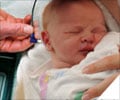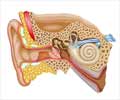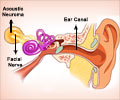Cochlear implantation offers an effective and safe way of restoring hearing in patients with far advanced otosclerosis (FAO), a hereditary condition that can lead to severe hearing loss.

FAO causes abnormal growth of bone in the middle and inner ear. This bone prevents structures within the ear from working properly and it diminishes hearing. Therapies have included fluoride pills to potentially prevent development of hearing loss, but they will not improve hearing loss that has already developed. Hearing aids are commonly prescribed for patients with FAO. Surgery is an option with an operation called a stapedectomy, or stapedotomy, where an otologist (ear surgeon) bypasses the diseased bone with a prosthetic device that allows sound waves to be passed to the inner ear. However, in cases with advanced disease, stapedectomy surgery is not effective in restoring hearing, and the patient is essentially deaf, even with the strongest hearing aids.
The authors studied the records of 30 patients with FAO with age-matched controls who suffered from hearing loss from other causes besides FAO. The researchers found that previous concerns about possible complications thought to potentially affect cochlear implantation in FAO patients were not seen using newer surgical techniques.
Cliff A. Megerian, MD, senior author on the study, noted, "Although a significant percentage of these patients required the additional operative step of 'round window drill out,' this finding in no way diminished the excellent hearing outcomes enjoyed using cochlear implantation. In addition, the study showed that the presence of abnormalities on radiographic imaging did not affect hearing following implantation." Dr. Megerian is Director, Otology, Neurotology, and Cochlear Implants, UH Case Medical Center, and a Professor at Case Western Reserve University School of Medicine.
The findings were presented at the115th Annual Meeting of the Triological Society, the most prestigious meeting for ear, nose and throat specialists. Gail S. Murray, PhD, Director of Audiology Services at UH Case Medical Center, was also an author on the paper.
Source-Eurekalert













